Adobe Experience Manager
AEM (Adobe Experience Manager) is a Content Management System (CMS) that allows users and companies to easily build websites, apps, and manage web pages and content. AEM is used by developers and marketers to organize and distribute content across digital channels.
Before setting up
Before you connect to AEM, you need to have the following:
- AEM instance running and accessible from the Blackbird platform.
- The Blackbird AEM plugin installed on your AEM instance. Its distribution and installation instructions can be found here (prerequisites 1-8) and an AEM maintainer/developer should perform this installation.
- You have a technical account and created a private key for it so you can obtain a certificate to connect to AEM (after installing the plugin). Below in the
Steps to create technical accountsection, you can find the steps to create a technical account and a private key and how to obtain a certificate. - You know your base URL for AEM environment. The base URL is the URL of your AEM instance, e.g.
https://author-xxxx-xxxxx.adobeaemcloud.com.
Steps to create technical account and get a certificate
- Open Cloud Manager.
- Select needed program.
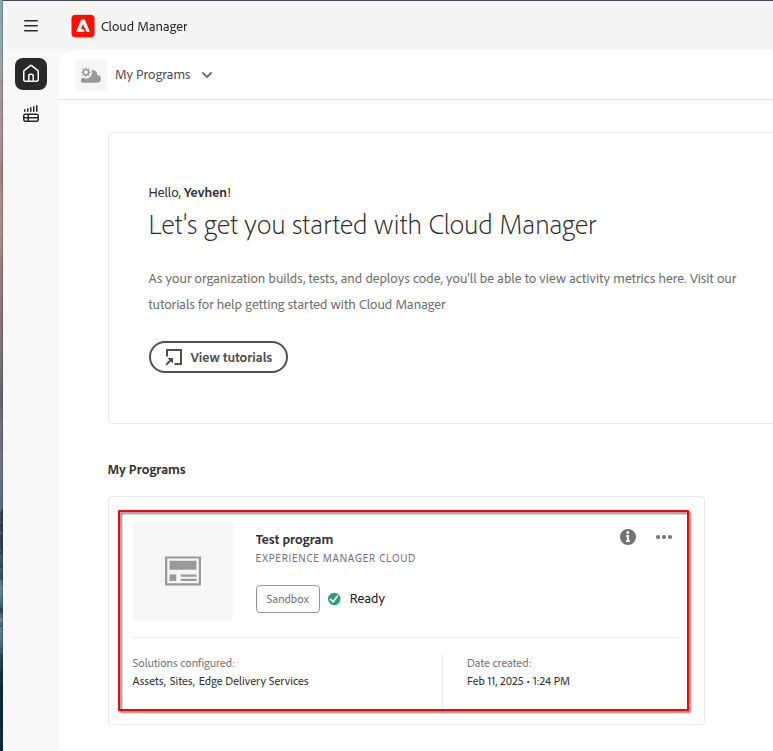
- Open Developer Console for needed Author environment.
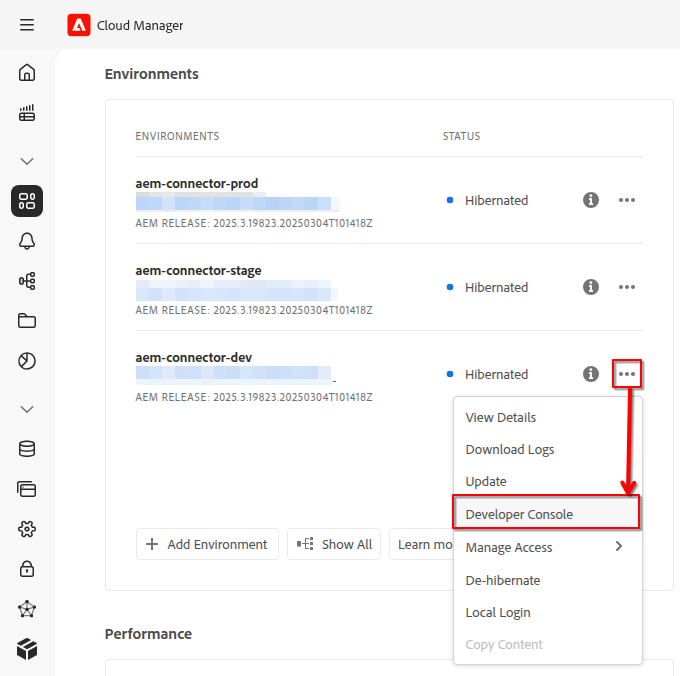
- Switch to
Integrationstab andCreate new technical account.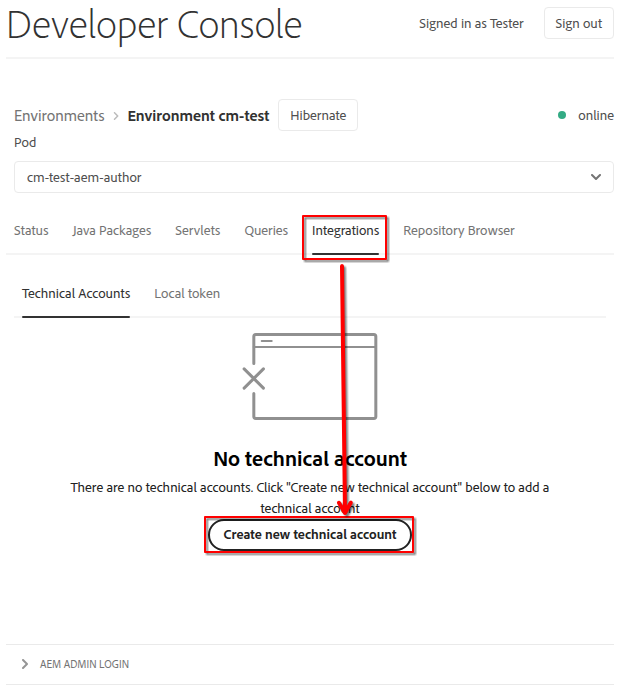
- Unfold created private key and
Viewthe data.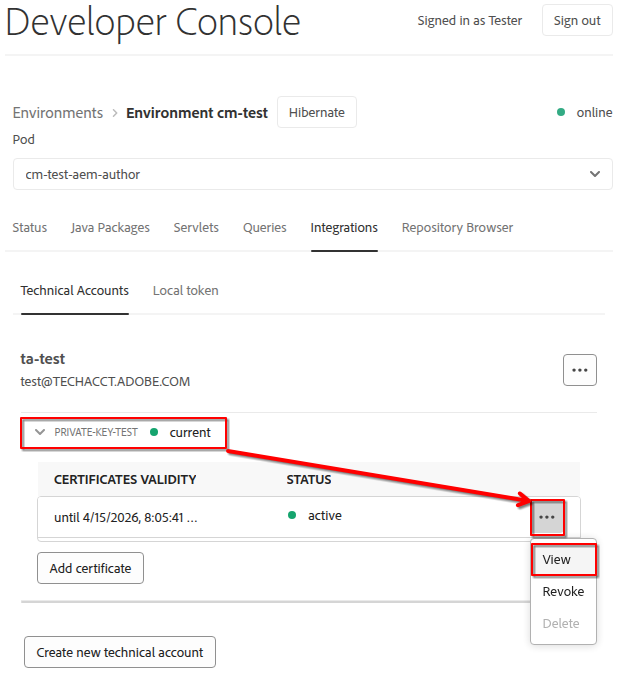
- Use the
Downloadbutton to obtain the raw data and store it in a file or another location from which it will be used for integration.
Connecting
- Navigate to apps and search for AEM
- Click Add Connection
- Name your connection for future reference e.g., ‘My AEM’
- Fill in the following fields:
- Base URL: Your AEM base URL (e.g.,
https://author-xxxx-xxxxx.adobeaemcloud.com) - Integration JSON certificate: Integration certificate in JSON format. Can be found in the Developer Console. Example: [ “ok”: true, “integration”: [ “imsEndpoint”: “ims-na1.adobelogin.com”, … ] “statusCode”: 200]
- Base URL: Your AEM base URL (e.g.,
- Click Connect
- Confirm that the connection has appeared and the status is Connected

Actions
- Search content: Search for content based on provided criteria.
- Download content: Download content as HTML. Requires a content ID. This action supports next optional inputs:
- Include reference content: If set to true, the action will include reference content in the downloaded HTML.
- Upload content: Upload content from HTML. Requires a HTML file and target path as input. This action supports the following inputs:
- File (mandatory): The HTML file to upload.
- Target page path (mandatory): The path where the content will be uploaded to.
- Source language (optional): The language path segment in the source content URL. Required for reference content uploads. Example: If your content path is ‘/content/my-site/en/us/page’, specify ‘/en/us’ as the source language.
- Target language (optional): The language path segment to replace the source language. Required for reference content uploads. Example: To convert from ‘/content/my-site/en/us/page’ to ‘/content/my-site/fr/fr/page’, specify ‘/fr/fr’ as the target language.
- Ignore reference content errors (optional): When set to true, errors that occur while updating reference content will be ignored.
Events
- On content created or updated: Polling event that periodically checks for new or updated content. If the any content are found, the event is triggered.
Example
Here’s an example of how to set up a translation workflow with AEM and DeepL apps that will automatically translate content in AEM and send it to DeepL for translation.
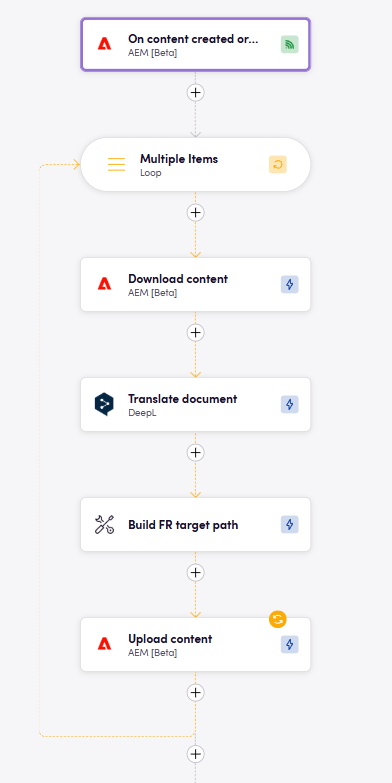
Here’s a notes on how the example works:
- The
On content created or updatedevent is triggered every hour and checks for new or updated content in AEM. If any content is found, the event is triggered. - In the loop, the
Download contentaction downloads the content from AEM in HTML format. - The
Translate documentaction ofDeepLapp sends the downloaded content to DeepL for translation. - The
Replace using Regexaction ofBlackbird Utilitiesapp replaces the original path to the target one in the translated content.
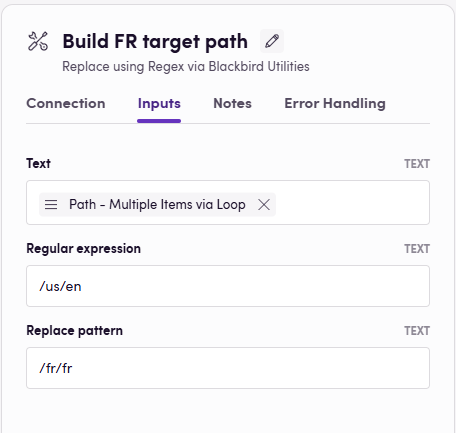
- The
Upload contentaction uploads the translated content back to AEM.
Feedback
Do you want to use this app or do you have feedback on our implementation? Reach out to us using the established channels or create an issue.